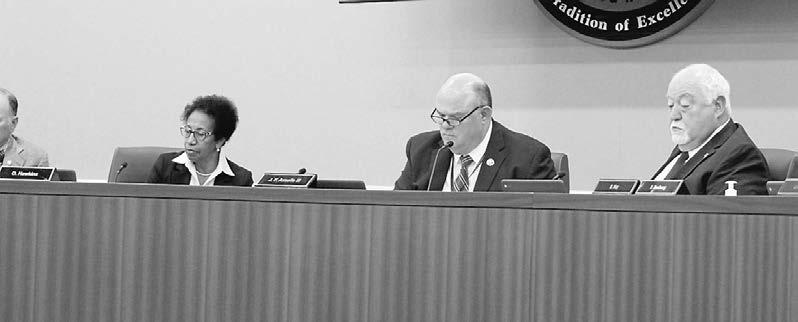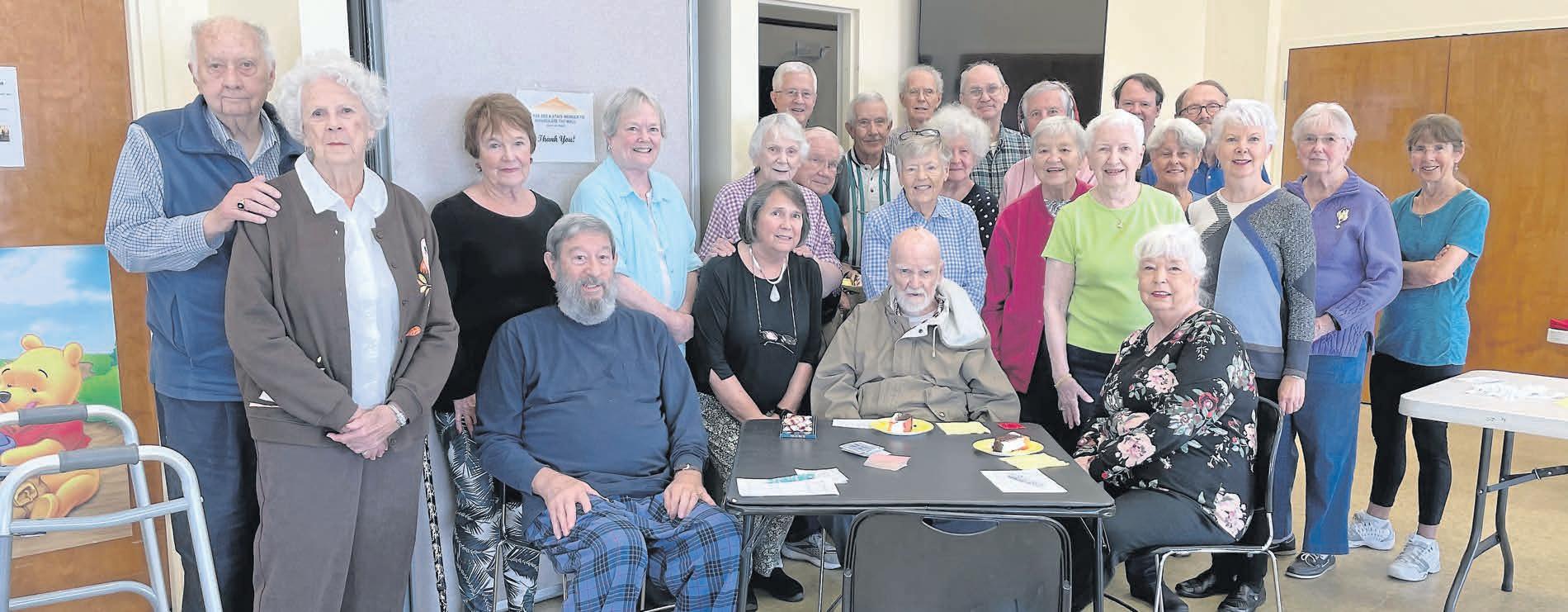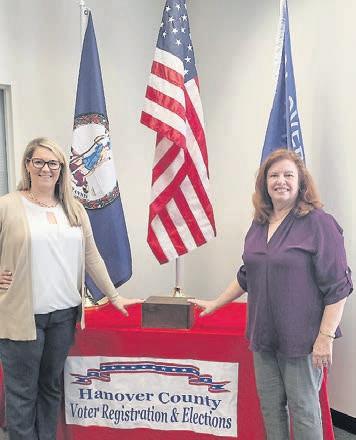
12 minute read
see SCHOOL
Th e fi rst woman to vote in the Mangohick precinct
Contributed Report Th e Local
Advertisement
When women were given the right to vote, Jayne Flowers’ grandmother was fortunate to be the first woman to vote in the Mangohick precinct in King William County in the November 1920 presidential race.
Annie McGeorge Moran was 23 years old when she was first able to vote. She was born in 1897, married in 1918, and had the first of her three children in 1919. Her husband, Julian Moran, served for many years as a poll worker for the Mangohick precinct. He made the ballot box that was used for the 1920 election.
Following the election, Moran was given the ballot box as a memento of that special occasion. It has been kept for over 100 years as a treasured piece of family history.
Information courtesy of Jayne Flowers, an officer of election for Hanover County since 2016.
Contributed photo
Annie McGeorge Moran was the fi rst woman in her precinct to vote.
SCHOOL
Continued from pg. 1
each elective represents a minimum of one to two years of work, and that staff is “hard at work” tackling other course requests.
Throughout the process, the HCPS Career and Technical Education (CTE) Advisory Board and the four high school principals assess where they may see gaps in their CTE course offerings and what areas of study students are interested in.
Greif said The Livestock Production Management and Introduction to Animal Systems courses were heavily requested by the community for various years. The two courses will go hand-in-hand in offering students a robust overview of animal agriculture and farm management.
The Introduction to Animal Systems course is designed to offer 10th and 11th grade students an opportunity to learn each of the major areas of the animal systems career pathway, including animal nutrition, reproduction, breeding, care, management and safety, along with agricultural mechanics applicable to animal systems. Students will be exposed to principles of leadership and opportunities within Future Farmers of America (FFA), along with Supervised Agricultural Experience opportunities. This is a foundational course for the agriculture animal programs.
Greif added in the Oct. 11 meeting that the animal systems course could potentially lead to the introduction of a small animal veterinary program within the HCPS Specialty Center at Hanover High School down the road.
The Livestock Production Management course is designed to offer 11th and 12th grade students an opportunity to learn how to supervise farming animal programs, including working with cows, pigs, horses, poultry, sheep and goats. This includes raising, handling, evaluating, feeding, breeding, caring for and transporting farm animals. Students will also learn about soil and water management, cropping programs on a farm, and financial elements of running a farm and livestock operation, including income, expense and production record forms. This course will include some instruction in agriculture mechanics, with emphasis placed on the application of mechanical skills to farm power and machinery.
Justin Roerink, principal of the Hanover Center for Trades and Technology and CTE coordinator, found strong interest in the two courses among 9th and 10th grade students. His survey found that 432 students indicated interest in the animal systems course and 357 students expressed interest in the livestock course. Much of their middle school population, in addition, indicated interest in the possibility of a veterinary science program.
Last week’s meeting attracted several supporters of the two courses who voiced their necessity in the community prior to the school board’s approval later in the evening.
Grace Stanley, a Patrick Henry High School (PHHS) student and member of FFA, voiced her support of the courses during the meeting’s public comment period. Stanley, who is a fourthgeneration dairy farmer in Ashland, identified the need for these courses while attending Liberty Middle School and started a petition for animal agriculture classes.
Stanley said in order to continue to be an FFA member in her junior and senior years, she must take an agriculture class.
“FFA is important to me because it is the only extracurricular activity in which I participate,” Stanley said. “It gives me leadership opportunities, and it is a chance for students interested in promoting agriculture to work together.”
She said many fellow FFA chapter members have some sort of farm animal.
“The limited number of agriculture courses offered to Hanover County students is out of balance to the importance of agriculture in Virginia. Agriculture is Virginia's biggest private industry by far,” Stanley said, adding that the industry has an economic impact of $70 billion annually and provides more than 334,000 jobs in the state, according to the Virginia Department of Agriculture.
Bom Harris, a livestock veterinarian that has worked with Stanley’s family farm, said the two courses will help mitigate the major farm labor shortage that exists today.
“Literally on a daily basis, I speak with farmers who are wondering whether they can stay in business simply because they cannot find people to work on their farms,” Harris said.
She said giving students the opportunity to learn about animal agriculture and farming could inspire them to take a job at a nearby farm, strengthening the county’s farming community and keeping its farms in business.
Harris also believes that these courses will offer students the ability to make informed and healthy decisions about what food they incorporate into their daily diet. “I believe that this broadens the horizons of our students and strengthens our rural community by inspiring an interest and knowledge about agriculture,” Harris said.
School board chair John Axselle commended Stanley for approaching him several years ago and kick-starting the process by explaining the courses’ necessity and garnering support in the community. “It makes us proud to see one of our students and members of the community already striving to become a productive and responsible member of our adult community,” he said.
The Marketing Exploration class replaces an existing course in order for HCPS to align their coursework with the state and will be offered at all four high schools. The course is designed to offer 9th and 10th grade students an opportunity to explore the world of marketing to understand its importance in today’s society. Students will develop essential skills related to interpersonal communication, self-presentation, economics, marketing, sales, employability, career discovery, promotion and ethical decision-making. This is a foundational course for the marketing programs.
The African American History course will align with a state course that has been available to students in Virtual Virginia and is designed to offer 11th and 12th grade students an opportunity to examine the role and contributions of African Americans to the growth and development of the U.S. Students will develop an understanding of the historical significance of the African American experience from African origins through the modern era. Primary and secondary sources are used to develop and support historical thinking skills.
“And we’ll know before we do any staffing in the spring whether these courses have enough enrollment to warrant shifting some staffing or bringing on new staff to teach,” Greif said in the Oct. 11 meeting.
For more information on offered HCPS classes and programs for CTE, visit the website, https://www.hcps.us/departments/instruction/ cte.
Christina Amano Dolan/The Local
During its Nov. 8 meeting, the Hanover County School Board unanimously approved four new courses that will be offered to high school students in the upcoming school year.

Contributed photo
The Ashland Bridge Club helped celebrate Hank Forkner’s 100th birthday at the Ashland Branch Library on Nov. 4. Three parties were held for Hank, including one held on Nov. 1 by the Atlee Bridge Club, and then another large celebration by his family and friends on his actual birthday, Saturday, Nov. 5 at Roma in Mechanicsville. The Atlee party was held at the home of one of the regular players in the club.
DoesitFeelLikeYour Heartis“Flopping”LikeaFish?
Ifyou’reexperiencingasensationslikethunderorfishfloppinginyour chest,light-headedness,fatigue,andshortnessofbreath,itmightbeA-fib, aseriousconditionthatcanincreaseyourriskofhavingastrokeby500%. A-fiboccurswhentheupperchambersoftheheartbeatirregularlyanddo notpumpallofthebloodtothelowerchambersoftheheart.Listento yourheart—anddonotignorechangestoyourheartbeat.Contactustoday toscheduleaheartrhythmscreeningifyou’reexperiencingsymptoms.

AcceptingNewPatients: 804-800-6600
8243MeadowbridgeRoadMechanicsville,Virginia23116 www.richmondheart.com
From the editor
Th e value of every voice found in a 1920 ballot box
By Christina Amano Dolan Editor
One of the most enjoyable highlights of floating around the Hanover County polling precincts on Nov. 8 was the undeniable spirit of the voters – who came in larger waves than I first anticipated. Voter after voter walking through the doors of their local polling place showed once again how this hands-on community not only values their voices but celebrates their impact, knowing that even one more ballot can make a difference.
Because as Officer of Election Jayne Flowers powerfully narrated in a fascinating interview, there was a time when not all of us had a voice that could be heard, and that there were those who preceded us that fought for the right to make a difference.
Flowers’ grandmother, Annie McGeorge Moran, was 23 years old when she made history in November of 1920. Writing the name of her preferred candidate for the presidential race, she placed her vote in a modest wooden box no bigger than an average shoebox made by her husband, Julian Moran, who served as a poll worker for the Magohick precinct in King William County.
Flowers said while records do not date back farther than the 1930s, she is curious how many voters placed a simple piece of paper in that little box.
“It’s interesting that people would just come in and write on a piece of paper who they wanted to vote for and put it in the box,” Flowers said. “And it had a key lock, and so at the end of the day, you

Photo courtesy of Hanover Countyl
Jayne Flowers stands left with Allison Fox, General Registrar for King William County, and Flowers’ prized 1920 ballot box passed down by her grandmother.
could just unlock it and open it up and counted the pieces of paper that were in there.”
“I think because I’m now an officer of election in Hanover, when you think of all the security and all the things that we go through, it’s so amazing to think that people have this trust in their neighbors that they are going to count and report the information accurately,” she added.
This little box would be passed down through generations of the family and treasured for 100 years, as it signifies a moment that Moran carried with pride throughout her whole life – the moment when she, placing her ballot in the box, became the very first woman to vote in her precinct. It still holds a pride of place in the family today.
“Even 64 years later, she still carried that pride and that distinction,” Flowers said, as her grandmother bestowed the cherished box to her son in her handwritten will.
But to Moran, Flowers and her family, they know that this box signifies a crucial turning point in history.
“When you think about it, you know, 102 years ago is really not very long in the history of the world, and to think that that point in time was so late for women to finally be able to vote,” Flowers said. “So many different groups have struggled so hard to have the right to vote.”
She acknowledged how too often, eligible voters across the country carry the thought: “What difference will one vote make?” when deciding to stay home on Election Day.
“It makes a huge difference,” Flowers said, and her grandmother held onto this ballot box knowing that even just one vote made history.
“I think that just tells you how much she treasured that ability to vote,” Flowers said. “And we can’t take it for granted. It’s too easy to do that because our lives in so many ways are so easy compared to the old days. We need to really treasure it and make sure that we have the type of country we want by being able to vote.”
While the 2022 Election Day is behind us, I will certainly remember Moran’s story and
see BALLOT, pg. 7

Editorial & Business Office and Mailing Address: 8460 Times-Dispatch Blvd. Mechanicsville, VA 23116 Phone – (804) 746-1235 Editor– (804) 212-6266 Toll free – (877) 888-0449 Fax – (804) 344-8746
Online: richmond.com/community/mechanicsville-local
Publisher Joy Monopoli .........................................jmonopoli@RSNVA.com Managing Editor Laura McFarland ....................lmcfarland@powhatantoday.com Editor Christina Amano Dolan ........................cdolan@mechlocal.com
Sports Editor Robby Fletcher.............................rfletcher@powhatantoday.com Production Manager Denine D’Angelo .................................ddangelo@mechlocal.com Sales Representative Tom Haynie ............................................thaynie@mechlocal.com Classifieds Cindy Adams ...........................................cadams@mechlocal.com
WE WANT TO PUBLISH YOUR ISSUE-DRIVEN LETTERS
The Local welcomes your signed letters to the editor on topics of interest to Hanover residents. Letters must include your address and a daytime telephone number. We reserve the right to edit letters. We do not guarantee that every letter received will be published. Letters reflect the opinions and positions of the writers and not The Ashland-Hanover Local.
Send letters to: The Ashland-Hanover Local 8460 Times-Dispatch Blvd. Mechanicsville, Va. 23116 Fax: 344-8746 E-mail: editor@mechlocal.com
© 2022 by Richmond Suburban Newspapers. All advertising and editorial matter is fully protected and may not be reproduced in any manner without the permission of the publisher. CAC Audited Circulation: 13,776.
| The Local Views
Get off my lawn?
By Jim Ridolphi Contributing Columnist
There’s a new controversy stirring in college football. It doesn’t involve late hits on the quarterback or over aggressive defensive backs. In fact it doesn’t even focus on any activity that occurs during the actual game, or any players participating in the game.
No, it’s the fans who are drawing the attention of some conference officials who are concerned that recent storming the field incidents have bordered on bedlam; and onfield security has been overwhelmed with the influx of fans invading their space following a big win.
Several weeks ago when Tennessee beat Alabama for the first time in 14 seasons, Neyland Stadium in Knoxville erupted and stands emptied, depositing thousands of enthusiastic – and in some cases inebriated – celebrants on ground usually reserved for players, coaches, officials and properly credentialed sideline support staff and press.
It’s all good fun, right? That is until someone gets hurt, and facts indicate that quite a few were injured in the Tennessee debacle. Accurate estimates of just how many sprained ankles or twisted knees were endured by the crazed fans are not available, and school officials are anxious to downplay the display.
An overhead shot of the stadium following the game was spectacular as large fireworks exploded atop a stadium filled to capacity squeezed onto the field.
“This isn’t going to end well,” I thought to myself.
And it didn’t. Southeastern Conference officials reacted last week with a release stating their intent to investigate field security and review current policies.
That press release came after the conference fined Tennessee $100,000 for the recent storming at Neyland
see LAWN, pg. 7


